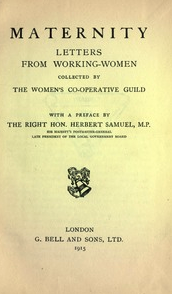1915
In 1915, Margaret Llewelyn Davies edited and published ‘Maternity – Letters From Working Women’. This moving collection of letters from members of the Women’s Co-operative Guild details their experiences of pregnancy, miscarriage, childbirth, stillbirth, infant death and parenting.

At the end of every letter was listed the family salary and the number of miscarriages, stillbirths and live children they had.
Wages 17s – 25s – 11 children, 2 miscarriages.
Wages 25s. 4 children, 10 miscarriages.
Wages 30s. 5 children, 5 miscarriages.
Wages 16s – 18s. 9 children, 1 stillbirth, 1 miscarriage.
These incredible letters enable us to hear the voices of working women speaking to us across time, describing their experience of motherhood (and often near-constant pregnancy) in a working-class family and without access to free healthcare. Anyone who has ever been pregnant will find something to relate to here.
The letters drew attention to the high level of perinatal loss and the need for better healthcare and financial support for parents. Many mothers had to do heavy and exhausting work throughout their pregnancies and return to work soon afterwards. They and their children’s health suffered as a result.
2020

In January 2020, artist Emma Smith exhibited equivalent stories of experiences of infertility, conception, perinatal loss, pregnancy, childbirth and parenting at the Cambridge Guildhall as part of a project called Women at Work.
Some things have changed in the interim. The NHS has given most women access to free healthcare (although some (often vulnerable) women are still charged for NHS maternity care). Family Allowance (now Child Benefit) was introduced. Sixty years after these letters were published, women gained a statutory right to maternity leave, pay and reinstatement.
There is much still to fight for. Statutory pay is too low. Expensive childcare and inflexible job design often make returning to work difficult and some employers still discriminate against women of childbearing age before, during and after pregnancy. Parents of premature babies are not entitled to any extra pay or leave, paternity leave is still appallingly low and most people don’t understand shared parental leave.
And there is still silence around loss.
The workplace is still set up for non reproducing bodies. Some elements of reproduction are – often badly – accommodated. Many are not. The silence around infertility, miscarriage and other pre 24-week losses means it is often ignored in management literature and practice.
Miscarriage and the workplace
My recent work for the Miscarriage Association has been on miscarriage in the workplace (ironically delayed by my own loss in September). I have been writing and filming a hub of information for employers, employees, managers and colleagues that will be launched by the Miscarriage Association in April.
I spoke about this work and the research that led up to it at an event associated with the Women at Work exhibition – Work Body Ready. This has been podcasted and you can listen here. My talk is about two-thirds of the way through the first podcast – but I also recommend listening to Jessica Hepburn’s talk about infertility (this does contain a graphic description of a miscarriage in public) and the second podcast too.


